For orders of 100 booklets or more, to request discounts on books purchased by the case, to order expedited shipping, or if you are ordering from outside the United States, please contact us directly via email at ccm@moscow.com or phone at (208) 883-0997. Phone and email orders of 100 copies or more of How to Be Free From Bitterness will receive a discounted price of $2.00 a copy. (Again, please contact us directly to order 100 copies or more.)
-
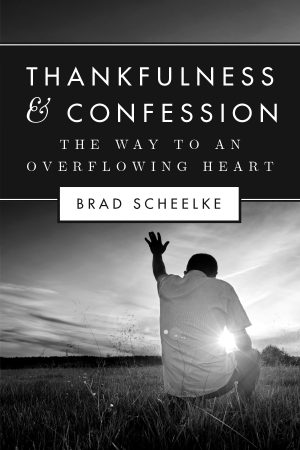 “Oh, the depth of the riches and wisdom and knowledge of God!” (Rom. 11:33). Our heavenly Father has given us unfathomable blessings, but we often fail to live as if they are truly ours. In thankfulness and Confession, Brad Scheelke encourages readers to meditate on and rejoice in the glorious riches of our inheritance in Christ. As we regularly give thanks for what God has given us, our thoughts and actions will begin to change . . . often in surprising ways. Gratitude also changes how we deal with sin. When we confess our sin, bringing it into the light of Christ’s riches, we now see not only the darkness of our own evil, but also the beauty of God’s holiness and grace. When we learn to practice thankfulness and confession in this way, our hearts will overflow in joy, in love for one another, and in glory to God.
“Oh, the depth of the riches and wisdom and knowledge of God!” (Rom. 11:33). Our heavenly Father has given us unfathomable blessings, but we often fail to live as if they are truly ours. In thankfulness and Confession, Brad Scheelke encourages readers to meditate on and rejoice in the glorious riches of our inheritance in Christ. As we regularly give thanks for what God has given us, our thoughts and actions will begin to change . . . often in surprising ways. Gratitude also changes how we deal with sin. When we confess our sin, bringing it into the light of Christ’s riches, we now see not only the darkness of our own evil, but also the beauty of God’s holiness and grace. When we learn to practice thankfulness and confession in this way, our hearts will overflow in joy, in love for one another, and in glory to God. -
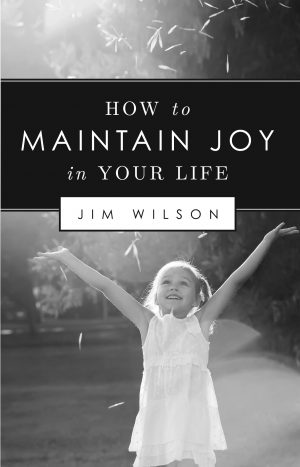
Rejoice in the Lord always: again I will say, rejoice. (Phil. 4:4 NKJV)
Restore to me the joy of your salvation and grant me a willing spirit to sustain me. (Psalm 51:12)
Have you ever felt like you are just wasting away, like your strength is sapped? The normal Christian life is a life of joy. Yet many (if not most) Christians are not consistently joyful. What is it that keeps us from obeying the command to rejoice always? Often, it is unconfessed and unrepented sin that hinders us from living a life of joy.
In this short booklet, Jim Wilson shares the story of his early Christian walk and his journey towards understanding the connection between repentance and rejoicing in the Lord. With Scripture, graphs, and clear explanations, he helps us see how failure to confess sins quickly steals our joy and how keeping short accounts—both with God and with others—sets us free to rejoice in the Lord no matter the circumstances.
-
 In Christianity and all religions that claim to be Christian, there is a promise of salvation. The promise may be conditional, or it may be positive, but it will be based on either doctrine or works. This booklet gives nine biblical, experiential evidences of salvation. When a person compares his experiences with those described in the Bible, he may come to one of several conclusions:
In Christianity and all religions that claim to be Christian, there is a promise of salvation. The promise may be conditional, or it may be positive, but it will be based on either doctrine or works. This booklet gives nine biblical, experiential evidences of salvation. When a person compares his experiences with those described in the Bible, he may come to one of several conclusions:- He thought he was not saved, but he finds out that he is.
- He thought he was saved, but finds out he isn't.
- He thought he was not saved, and that is confirmed.
- He thought he was saved, and now he knows that he is.

-
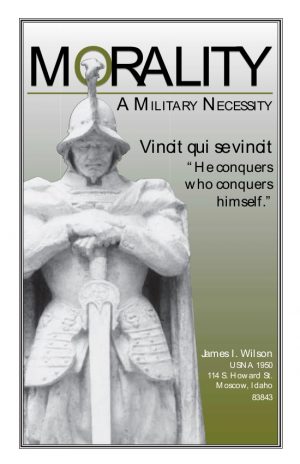 Vincit qui se vincit“He conquers who conquers himself.”Is it ok to be in the military and be moral? The answer is yes. In the early 1950s, my ship left San Diego for the Western Pacific. We had eighteen “boots” aboard. The captain decided that these young men needed to be protected, and should be informed of the facts of life. It was a three-pronged effort. The exec talked to the men in a fatherly sort of way about their mothers, their sisters, their hometown girlfriends, and their wives. This nostalgia was to protect them from waywardness. An “assigned” chaplain talked with them about absolute morality and sin. And finally, the medical officer and the corpsman taught them about condoms and “past event cleansing.” ... The training had left out the effects of peer pressure... This essay was first written for the U.S. Naval Institute Prize Essay Contest. Because of the gross moral lapses in the U.S. military in the last few decades, I thought I should prepare it for distribution to our future leaders. It is dedicated to the future military leadership of the United States. - James I. Wilson
Vincit qui se vincit“He conquers who conquers himself.”Is it ok to be in the military and be moral? The answer is yes. In the early 1950s, my ship left San Diego for the Western Pacific. We had eighteen “boots” aboard. The captain decided that these young men needed to be protected, and should be informed of the facts of life. It was a three-pronged effort. The exec talked to the men in a fatherly sort of way about their mothers, their sisters, their hometown girlfriends, and their wives. This nostalgia was to protect them from waywardness. An “assigned” chaplain talked with them about absolute morality and sin. And finally, the medical officer and the corpsman taught them about condoms and “past event cleansing.” ... The training had left out the effects of peer pressure... This essay was first written for the U.S. Naval Institute Prize Essay Contest. Because of the gross moral lapses in the U.S. military in the last few decades, I thought I should prepare it for distribution to our future leaders. It is dedicated to the future military leadership of the United States. - James I. Wilson -
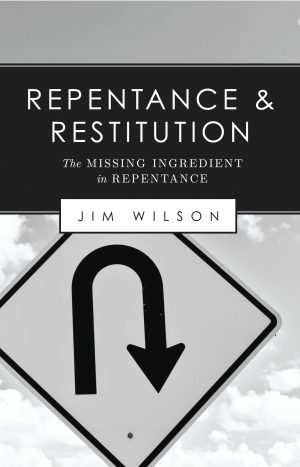 Jesus’ death paid for our sins - the guilt, the death, and the punishment. Jesus does not repay the man who got ripped off when we stole from him. According to the Bible, the person who comes to the Lord in repentance is to pay the one he stole from the value of the stolen goods plus one fifth of the value. But what if it is a candy bar you took twenty years ago? The amount stolen and the time since the theft do not make it yours. There are many Christians who are living subnormal Christian lives because they are too proud or too afraid to make restitution. They are like people with low-grade fevers; they are not sick enough to be in bed, but too sick to do anything worthwhile. Even if no one knows about the thefts, these Christians are poor witnesses for Jesus Christ. They may have confessed and repented in words, but if they do not make restitution, it is not true repentance, and they are not forgiven.
Jesus’ death paid for our sins - the guilt, the death, and the punishment. Jesus does not repay the man who got ripped off when we stole from him. According to the Bible, the person who comes to the Lord in repentance is to pay the one he stole from the value of the stolen goods plus one fifth of the value. But what if it is a candy bar you took twenty years ago? The amount stolen and the time since the theft do not make it yours. There are many Christians who are living subnormal Christian lives because they are too proud or too afraid to make restitution. They are like people with low-grade fevers; they are not sick enough to be in bed, but too sick to do anything worthwhile. Even if no one knows about the thefts, these Christians are poor witnesses for Jesus Christ. They may have confessed and repented in words, but if they do not make restitution, it is not true repentance, and they are not forgiven. -
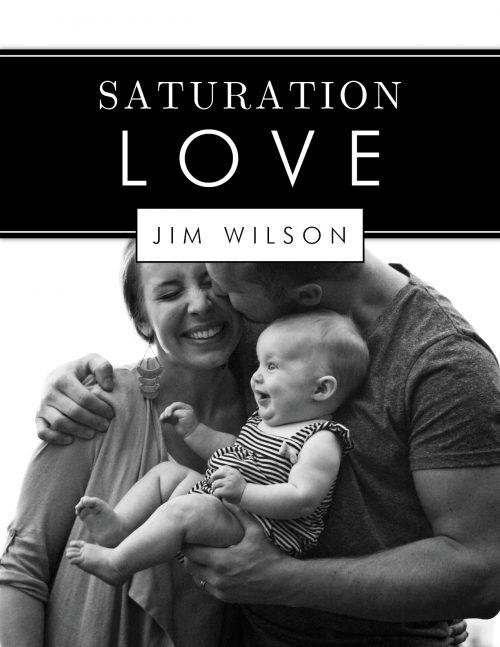 We love our kids, but do we love like God loves....without conditions, reservations, or reluctance? In this excerpt from his popular book How to be Free from Bitterness, Jim Wilson identifies the troublesome consequences of insufficient parental love and points readers to the glorious fruit of superabundant kindness, and patience and helps parents apply the eternal truths of Scripture to grow peace and joy in their homes.
We love our kids, but do we love like God loves....without conditions, reservations, or reluctance? In this excerpt from his popular book How to be Free from Bitterness, Jim Wilson identifies the troublesome consequences of insufficient parental love and points readers to the glorious fruit of superabundant kindness, and patience and helps parents apply the eternal truths of Scripture to grow peace and joy in their homes.
-
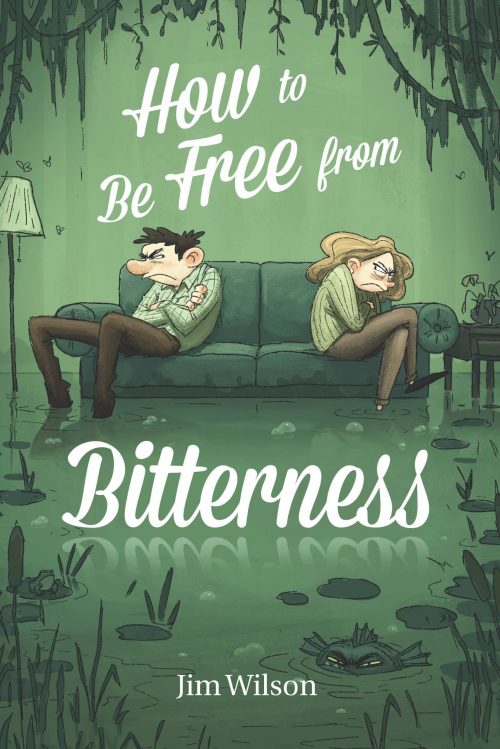 Bitterness often grows out of a small offense - perhaps a passing word, an accidental shove, or a pair of dirty socks left in the middle of the living room floor. Yet when bitterness takes root in our hearts, its effects are anything but small. In this collection of short articles, Jim Wilson and others discuss what it means to live as "imitators of God." As the Apostle Paul says in Ephesians, we have been called to leave the bitterness and anger of the world and instead embrace the love and compassion of our God. The authors remind us that we are to forgive others just as we have been forgiven, pointing to Scriptural admonitions and examples as they offer sound teaching on the trials and temptations of everyday life. Have an Audible account? Get this title on Audible here. Did you know we give away more copies of How to Be Free from Bitterness than we sell? These copies are paid for entirely by donations. Have you been blessed by this booklet? You can help fund copies for someone else by making a tax-deductible gift to the literature fund here.
Bitterness often grows out of a small offense - perhaps a passing word, an accidental shove, or a pair of dirty socks left in the middle of the living room floor. Yet when bitterness takes root in our hearts, its effects are anything but small. In this collection of short articles, Jim Wilson and others discuss what it means to live as "imitators of God." As the Apostle Paul says in Ephesians, we have been called to leave the bitterness and anger of the world and instead embrace the love and compassion of our God. The authors remind us that we are to forgive others just as we have been forgiven, pointing to Scriptural admonitions and examples as they offer sound teaching on the trials and temptations of everyday life. Have an Audible account? Get this title on Audible here. Did you know we give away more copies of How to Be Free from Bitterness than we sell? These copies are paid for entirely by donations. Have you been blessed by this booklet? You can help fund copies for someone else by making a tax-deductible gift to the literature fund here. -
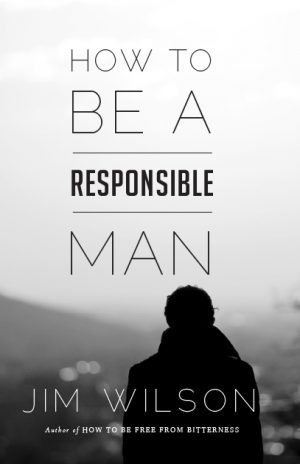
Men were designed, created, and commanded to bear responsibility, but our history of failure in this area stretches all the way back to Adam. Today irresponsibility is considered normal, even a birthright. Jim Wilson outlines the causes and results of this failure, the biblical principles and characteristics that define a responsible man, and how men can apply them both in their own lives and in raising their sons.
Masculinity does not have to be proved with muscularity, sexual prowess, or bragging. True masculinity is established by taking up the responsibility God has given you.
-
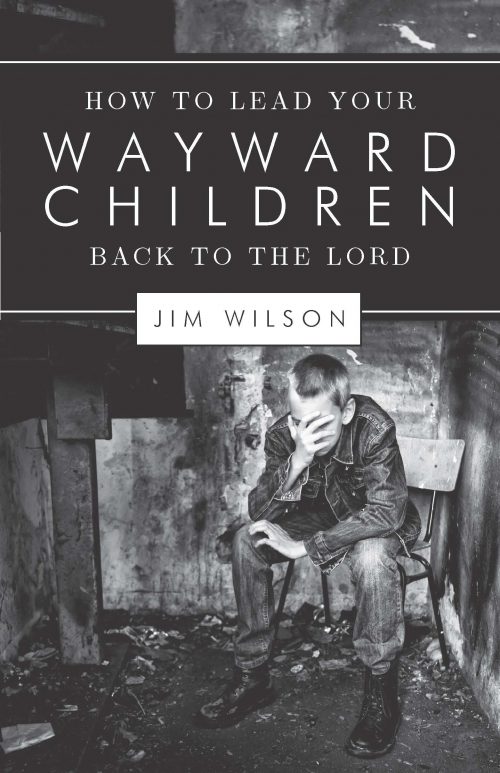 You love God. You love your kids. So why don’t they love Him? God promises lovingkindness to a thousand generations for families who love and obey Him (Deut. 7:9). Why are children who grew up in Christian homes leaving the faith, and how do we get them to come back? No matter how old your children are, there is a solution. With decades of pastoral wisdom, Jim Wilson identifies the common causes of rebellion and helps parents apply the eternal truths of Scripture to “turn the hearts of the parents to their children and the disobedient to the wisdom of the righteous—to make ready a people prepared for the Lord” (Luke 1:17).
You love God. You love your kids. So why don’t they love Him? God promises lovingkindness to a thousand generations for families who love and obey Him (Deut. 7:9). Why are children who grew up in Christian homes leaving the faith, and how do we get them to come back? No matter how old your children are, there is a solution. With decades of pastoral wisdom, Jim Wilson identifies the common causes of rebellion and helps parents apply the eternal truths of Scripture to “turn the hearts of the parents to their children and the disobedient to the wisdom of the righteous—to make ready a people prepared for the Lord” (Luke 1:17).
-
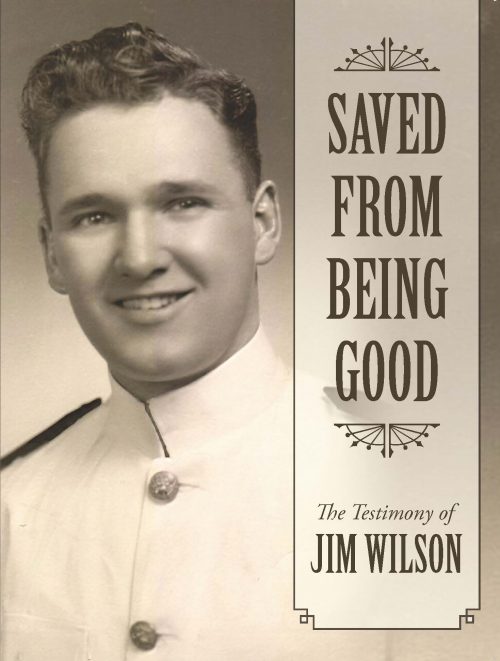 Naval Academy midshipman Jim Wilson didn't cuss or smoke or chew or go with girls who do. When a friend asked him if he was going to heaven, Jim replied, "If someone like me can't make it, heaven is going to be thinly populated." It was a serious answer, but his friend laughed. Jim was in for a surprise: Turns out you have to be bad to go to heaven.
Naval Academy midshipman Jim Wilson didn't cuss or smoke or chew or go with girls who do. When a friend asked him if he was going to heaven, Jim replied, "If someone like me can't make it, heaven is going to be thinly populated." It was a serious answer, but his friend laughed. Jim was in for a surprise: Turns out you have to be bad to go to heaven. -
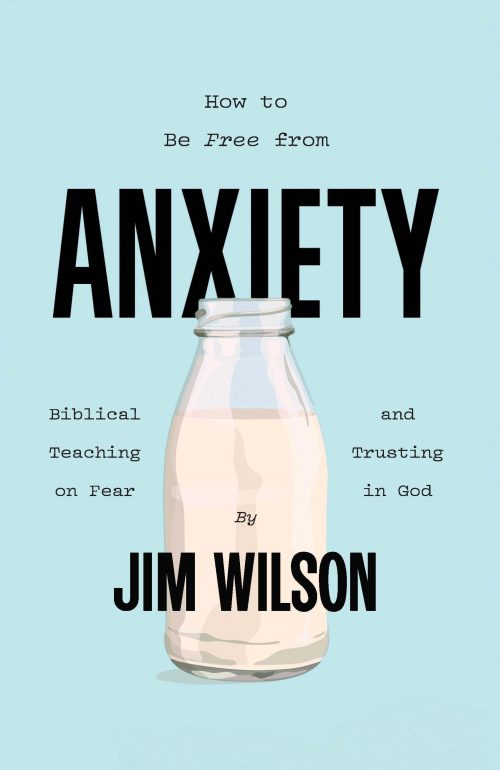 Hope is a promise of God. Anxiety is a lie of Satan. When we are anxious, we become immobilized. We cannot make decisions; we cannot get things done; we cannot sleep. What can we do to be free from this constant worry? “Fear not, for I am with you; be not dismayed, for I am your God; I will strengthen you, I will help you, I will uphold you with my righteous right hand” (Isa. 41:10). “So do not worry, saying, ‘What shall we eat?’ or ‘What shall we drink?’ or ‘What shall we wear?’ For the pagans run after all these things, and your heavenly Father knows that you need them. But seek first his kingdom and his righteousness, and all these things will be given to you as well” (Matt. 6:31–33). “Cast all your anxiety on him because he cares for you” (1 Pet. 5:7). In this booklet, Jim Wilson teaches you how to trust God and be free from anxiety every day. God knows our needs, God is faithful, and He cares for you.
Hope is a promise of God. Anxiety is a lie of Satan. When we are anxious, we become immobilized. We cannot make decisions; we cannot get things done; we cannot sleep. What can we do to be free from this constant worry? “Fear not, for I am with you; be not dismayed, for I am your God; I will strengthen you, I will help you, I will uphold you with my righteous right hand” (Isa. 41:10). “So do not worry, saying, ‘What shall we eat?’ or ‘What shall we drink?’ or ‘What shall we wear?’ For the pagans run after all these things, and your heavenly Father knows that you need them. But seek first his kingdom and his righteousness, and all these things will be given to you as well” (Matt. 6:31–33). “Cast all your anxiety on him because he cares for you” (1 Pet. 5:7). In this booklet, Jim Wilson teaches you how to trust God and be free from anxiety every day. God knows our needs, God is faithful, and He cares for you. -
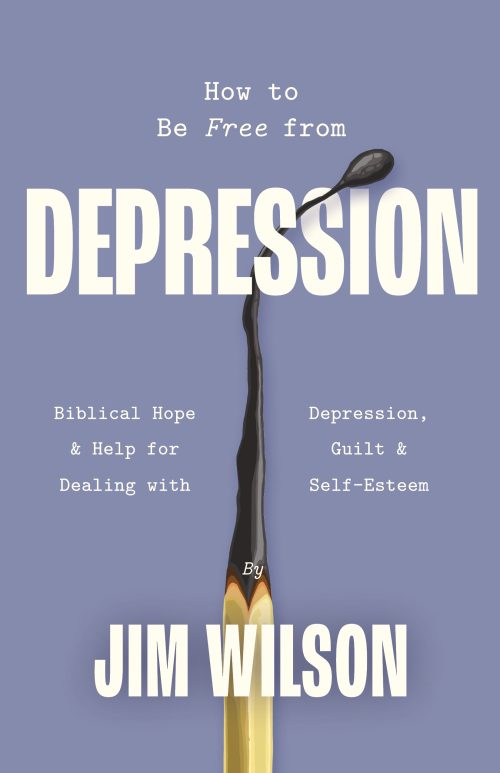 The thoughts you have when you’re depressed come from the devil. The good news for you is that the devil is a liar. Do you feel weighed down all the time? Perhaps, although you are a Christian and know you’re going to heaven, your spiritual life seems mediocre at best. You know the Bible says to rejoice always, and you’d like to be living joyfully, but you just don’t know how. In this sequel to How to Be Free from Bitterness, Jim Wilson returns to talk about how to deal with (and get rid of) depression, feelings of guilt, and problems with self-esteem. Many Christians feel like they are enslaved to these sins, like there is no way out. But this is not true. The truth is that Christ has freed us from the penalty of sin and the power of sin. If you are a Christian, you are already free. Depression, guilt, low self-esteem—whatever your problem is, it can be put to death. “And you will know the truth, and the truth will make you free” (John 8:32).
The thoughts you have when you’re depressed come from the devil. The good news for you is that the devil is a liar. Do you feel weighed down all the time? Perhaps, although you are a Christian and know you’re going to heaven, your spiritual life seems mediocre at best. You know the Bible says to rejoice always, and you’d like to be living joyfully, but you just don’t know how. In this sequel to How to Be Free from Bitterness, Jim Wilson returns to talk about how to deal with (and get rid of) depression, feelings of guilt, and problems with self-esteem. Many Christians feel like they are enslaved to these sins, like there is no way out. But this is not true. The truth is that Christ has freed us from the penalty of sin and the power of sin. If you are a Christian, you are already free. Depression, guilt, low self-esteem—whatever your problem is, it can be put to death. “And you will know the truth, and the truth will make you free” (John 8:32). -
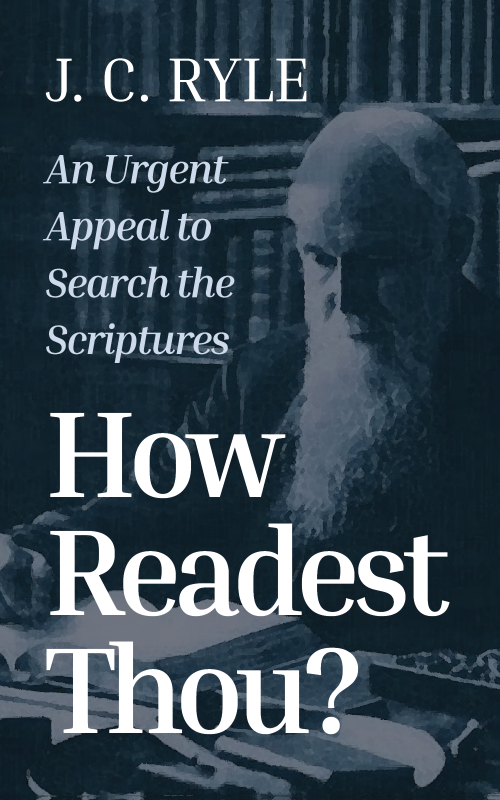 Join J.C. Ryle as he explains the benefits of reading (and rereading) the Bible, and find inspiration for your daily devotions in this classic work. Do you read the Bible? “I’m not a Christian, so what’s the point?” “I read it once – why do I need to read it again?” Why should you read the Bible? For eighteen centuries it has been studied and prayed over by millions of Christians and explained and preached by thousands of ministers. It meets the hearts and minds and consciences of Christians in the twenty-first century as fully as it did when it was first completed. It is still the first book which fits children’s minds when they begin to learn religion, and the last to which the old man clings as he leaves the world. It is the book for every heart, because God who alone knows all hearts dictated it. The Bible alone explains the state of things that we see in the world around us. There are many things on earth which a natural man cannot explain. The amazing inequality of conditions, the poverty and distress, the oppression and persecution, the failures of politicians and legislators, the constant existence of uncured evils and abuses—all these things are often puzzling. We see it, but do not understand. But the Bible makes it all clear. Do you read the Bible? Come and read the book whose teaching “turned the world upside down.” Come read the Bible.
Join J.C. Ryle as he explains the benefits of reading (and rereading) the Bible, and find inspiration for your daily devotions in this classic work. Do you read the Bible? “I’m not a Christian, so what’s the point?” “I read it once – why do I need to read it again?” Why should you read the Bible? For eighteen centuries it has been studied and prayed over by millions of Christians and explained and preached by thousands of ministers. It meets the hearts and minds and consciences of Christians in the twenty-first century as fully as it did when it was first completed. It is still the first book which fits children’s minds when they begin to learn religion, and the last to which the old man clings as he leaves the world. It is the book for every heart, because God who alone knows all hearts dictated it. The Bible alone explains the state of things that we see in the world around us. There are many things on earth which a natural man cannot explain. The amazing inequality of conditions, the poverty and distress, the oppression and persecution, the failures of politicians and legislators, the constant existence of uncured evils and abuses—all these things are often puzzling. We see it, but do not understand. But the Bible makes it all clear. Do you read the Bible? Come and read the book whose teaching “turned the world upside down.” Come read the Bible. -
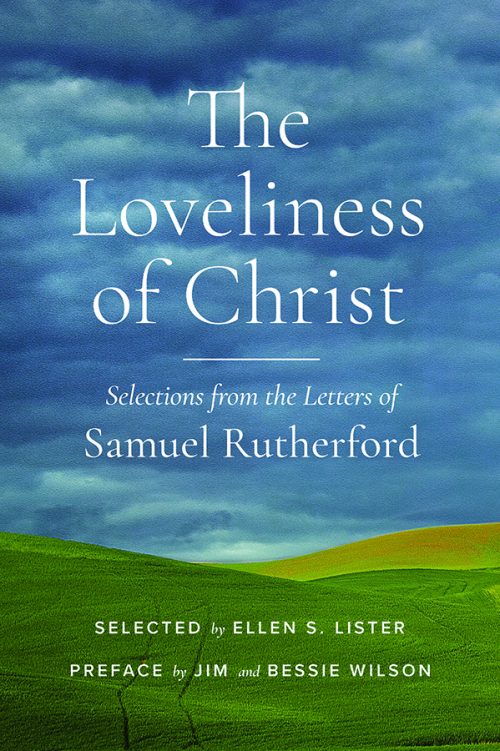 "Christ is kindest in His love when we are at our weakest." - Samuel Rutherford When we read The Loveliness of Christ, it is as though a curtain is raised for us, enabling us to observe a man so taken up with his Lord that we want to kneel with him. It is not a book to read straight through, but to graze in, appropriating what we need, going back during a trial and seeing what we missed on our first reading. It is a book to mark in with “so true,” and, “Lord, let it be my experience too.”
"Christ is kindest in His love when we are at our weakest." - Samuel Rutherford When we read The Loveliness of Christ, it is as though a curtain is raised for us, enabling us to observe a man so taken up with his Lord that we want to kneel with him. It is not a book to read straight through, but to graze in, appropriating what we need, going back during a trial and seeing what we missed on our first reading. It is a book to mark in with “so true,” and, “Lord, let it be my experience too.” -
 The Holy Spirit is in business these days. Christ is healing wounds that no one else can heal. People all over the world are experiencing the love of God in a new way. The Spirit is blowing our fences down, reconciling us to God and each other. Sin remains just talk about ethics, until the Holy Spirit comes, and we find ourselves caught red-handed in His revealing light. But the blessed Holy Spirit is not a policeman. He is the Friend of the guilty. He convicts in order to liberate. See what happens when a person comes afresh to Him.
The Holy Spirit is in business these days. Christ is healing wounds that no one else can heal. People all over the world are experiencing the love of God in a new way. The Spirit is blowing our fences down, reconciling us to God and each other. Sin remains just talk about ethics, until the Holy Spirit comes, and we find ourselves caught red-handed in His revealing light. But the blessed Holy Spirit is not a policeman. He is the Friend of the guilty. He convicts in order to liberate. See what happens when a person comes afresh to Him. -
 “I had never read anything like this in the religious books of the Hindus.” After years of searching for something more than the hopeless existence her religion offered to those not born into a high caste, Pandita had at last discovered someone who could uplift the downtrodden women of India—and every land. “To me, who but a few moments ago ‘sat in the region and shadow of death, light had sprung up’ (Matthew 4:16).” In An Honorable Heritage, Pandita Ramabai tells her story of being born into the privileged Brahman caste and leaving tradition behind for something far better—the light and hope she found in Christ.
“I had never read anything like this in the religious books of the Hindus.” After years of searching for something more than the hopeless existence her religion offered to those not born into a high caste, Pandita had at last discovered someone who could uplift the downtrodden women of India—and every land. “To me, who but a few moments ago ‘sat in the region and shadow of death, light had sprung up’ (Matthew 4:16).” In An Honorable Heritage, Pandita Ramabai tells her story of being born into the privileged Brahman caste and leaving tradition behind for something far better—the light and hope she found in Christ. -
 “Above all else, guard your heart, for it is the wellspring of life” (Prov. 4:23). Whether we know it or not, all of us have had heart trouble. The good news is that Jesus Christ is the best heart specialist of all time. In this collection, Bessie examines the Bible’s references to the heart: what God says about our condition, and what provision He has made for us in Jesus Christ. It is no-nonsense Bible teaching with an emphasis on practical application.
“Above all else, guard your heart, for it is the wellspring of life” (Prov. 4:23). Whether we know it or not, all of us have had heart trouble. The good news is that Jesus Christ is the best heart specialist of all time. In this collection, Bessie examines the Bible’s references to the heart: what God says about our condition, and what provision He has made for us in Jesus Christ. It is no-nonsense Bible teaching with an emphasis on practical application. -
 Put on your armor—it’s time to fight. We are in a spiritual war, William Gurnall reminds us, and “the Christian’s safety lies in resisting. All the armour provided is to defend the Christian fighting, none to secure him flying; stand, and the day is ours; fly or yield, and all is lost.” This hard-hitting volume is packed with biblical wisdom for day-to-day Christian living, as helpful today as it was when first published nearly four hundred years ago. Although history left us little knowledge of William Gurnall’s life, it preserved this book—a legacy that has encouraged many generations of saints to fight sin, love Christ, and live holy and faithful lives as Christians who have clothed themselves in the complete armor of God. “Amongst all the Puritan writings that have come down to us, none…are more practical than this one.” – Hamilton Smith Have an Audible subscription? You can also get this title on Audible here.
Put on your armor—it’s time to fight. We are in a spiritual war, William Gurnall reminds us, and “the Christian’s safety lies in resisting. All the armour provided is to defend the Christian fighting, none to secure him flying; stand, and the day is ours; fly or yield, and all is lost.” This hard-hitting volume is packed with biblical wisdom for day-to-day Christian living, as helpful today as it was when first published nearly four hundred years ago. Although history left us little knowledge of William Gurnall’s life, it preserved this book—a legacy that has encouraged many generations of saints to fight sin, love Christ, and live holy and faithful lives as Christians who have clothed themselves in the complete armor of God. “Amongst all the Puritan writings that have come down to us, none…are more practical than this one.” – Hamilton Smith Have an Audible subscription? You can also get this title on Audible here. -
 The Christian faith has repeatedly been called a “religion of the book.” Along with the incarnate Word and the oral word of preaching, God has chosen the medium of books to proclaim His goodness to us. The Bible is the book per se, and it sets the standard for the Christian faith. The Protestant Reformation of the sixteenth century saw the dramatic power of the printed word to bring light out of darkness as literature changed the thought and life of nations. The Reformers used pamphlets and tracts extensively to bring about spiritual revolution—the printing press turned out to be the lever with which the enemy was lifted from his saddle. In A Religion of Books, Bockmuehl traces the role books played in the Reformation and through various movements of the Spirit in the following centuries. He also addresses how the written word shapes political movements and how Christians can continue to use literature to point people to Christ.
The Christian faith has repeatedly been called a “religion of the book.” Along with the incarnate Word and the oral word of preaching, God has chosen the medium of books to proclaim His goodness to us. The Bible is the book per se, and it sets the standard for the Christian faith. The Protestant Reformation of the sixteenth century saw the dramatic power of the printed word to bring light out of darkness as literature changed the thought and life of nations. The Reformers used pamphlets and tracts extensively to bring about spiritual revolution—the printing press turned out to be the lever with which the enemy was lifted from his saddle. In A Religion of Books, Bockmuehl traces the role books played in the Reformation and through various movements of the Spirit in the following centuries. He also addresses how the written word shapes political movements and how Christians can continue to use literature to point people to Christ. -
 Are you looking to strengthen your prayer life? Do you want to get into the habit of praying daily but don’t know where to start? Join Heather Torosyan as she walks through the prayers of Scripture with this 40-day prayer journal. At the end of each day’s reading, Heather offers a suggested prayer and leaves space for you to write in your own prayers. I will praise you, Lord, among the nations; I will sing of you among the peoples. For great is your love, reaching to the heavens; your faithfulness reaches to the skies. Be exalted, O God, above the heavens; let your glory be over all the earth. (Psalm 57:9-11 NIV)
Are you looking to strengthen your prayer life? Do you want to get into the habit of praying daily but don’t know where to start? Join Heather Torosyan as she walks through the prayers of Scripture with this 40-day prayer journal. At the end of each day’s reading, Heather offers a suggested prayer and leaves space for you to write in your own prayers. I will praise you, Lord, among the nations; I will sing of you among the peoples. For great is your love, reaching to the heavens; your faithfulness reaches to the skies. Be exalted, O God, above the heavens; let your glory be over all the earth. (Psalm 57:9-11 NIV) -
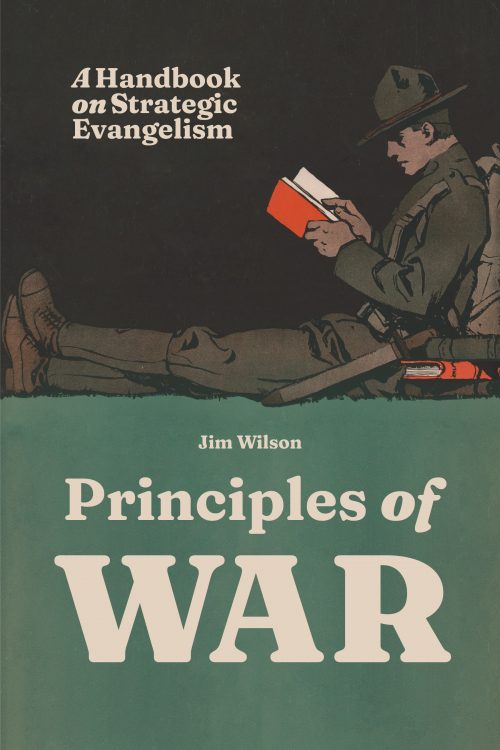
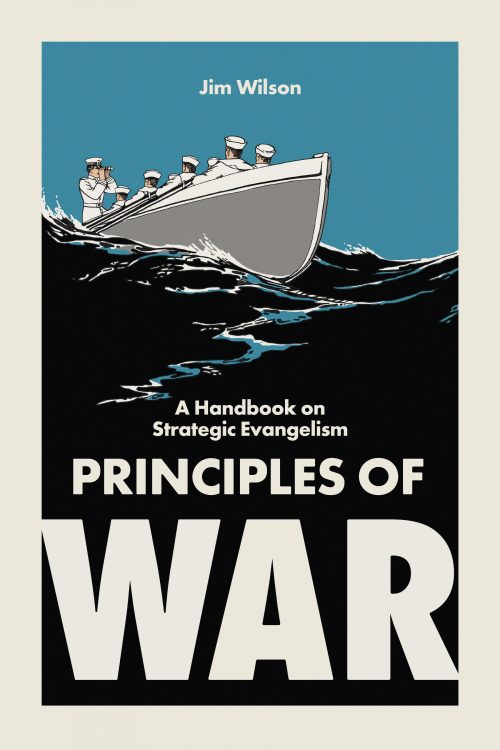 In the study of warfare, great men have concluded that there are some overriding principles which, if followed, will always tend toward success in battle, and if neglected or ignored, will tend toward defeat or even destruction. These principles have been entitled the "principles of war." But not all warfare is waged on a battlefield: every Christian is called to be a soldier. Our fight is against Satan, our objective is the acknowledgment and fulfillment of God's commands, and our ammunition is the power of the Holy Spirit. In Principles of War, Jim Wilson outlines the time-tried, fundamental principles of war and explains how we can employ them in our daily spiritual battles as we fight a war which our commander in chief has already won for us.
In the study of warfare, great men have concluded that there are some overriding principles which, if followed, will always tend toward success in battle, and if neglected or ignored, will tend toward defeat or even destruction. These principles have been entitled the "principles of war." But not all warfare is waged on a battlefield: every Christian is called to be a soldier. Our fight is against Satan, our objective is the acknowledgment and fulfillment of God's commands, and our ammunition is the power of the Holy Spirit. In Principles of War, Jim Wilson outlines the time-tried, fundamental principles of war and explains how we can employ them in our daily spiritual battles as we fight a war which our commander in chief has already won for us. -
 “Revolutionary love” sounds like an oxymoron. Revolution is usually a negative, violent, and destructive change, while love is positive, peaceful, and contented. But true love always changes people. And Christ’s love brings the most revolutionary change of all. Festo Kivengere (1919–88) experienced both kinds of revolution. He escaped Uganda when the brutal regime of Idi Amin seized power. But he could not escape the pursuit of Jesus, who came into his life with radically transformative grace. In Revolutionary Love, Kivengere tells his story of learning to freely receive Christ’s love and freely share it with others. Have an Audible subscription? You can also get this title on Audible here.
“Revolutionary love” sounds like an oxymoron. Revolution is usually a negative, violent, and destructive change, while love is positive, peaceful, and contented. But true love always changes people. And Christ’s love brings the most revolutionary change of all. Festo Kivengere (1919–88) experienced both kinds of revolution. He escaped Uganda when the brutal regime of Idi Amin seized power. But he could not escape the pursuit of Jesus, who came into his life with radically transformative grace. In Revolutionary Love, Kivengere tells his story of learning to freely receive Christ’s love and freely share it with others. Have an Audible subscription? You can also get this title on Audible here. -
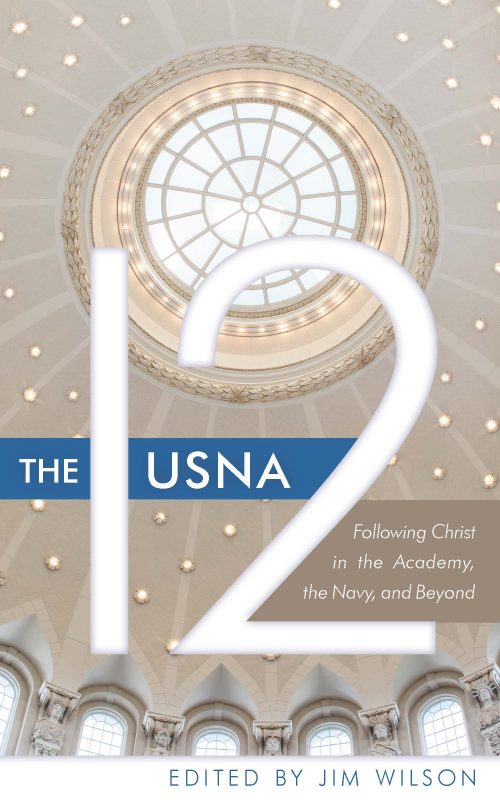 What does it mean to be faithful? How do you define success? Can you be a career naval officer and a Christian? In The USNA 12, graduates of the U.S. Naval Academy tell stories of their time at the Academy and how the experiences they had there transformed their lives. We trust that these stories will be a blessing to you and that this will be an example for similar books from each of the service academies in future years. “To them God has chosen to make known among the Gentiles the glorious riches of this mystery, which is Christ in you, the hope of glory. He is the one we proclaim, admonishing and teaching everyone with all wisdom, so that we may present everyone fully mature in Christ.” (Col. 1:27-28)
What does it mean to be faithful? How do you define success? Can you be a career naval officer and a Christian? In The USNA 12, graduates of the U.S. Naval Academy tell stories of their time at the Academy and how the experiences they had there transformed their lives. We trust that these stories will be a blessing to you and that this will be an example for similar books from each of the service academies in future years. “To them God has chosen to make known among the Gentiles the glorious riches of this mystery, which is Christ in you, the hope of glory. He is the one we proclaim, admonishing and teaching everyone with all wisdom, so that we may present everyone fully mature in Christ.” (Col. 1:27-28)

